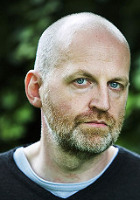Don Paterson Biography
Don Paterson is a Scottish poet, writer and musician.
on Paterson was born in Dundee. He won an Eric Gregory Award in 1990 and his poem A Private Bottling won the Arvon Foundation International Poetry Competition in 1993. He was included on the list of 20 poets chosen for the Poetry Society's 'New Generation Poets' promotion in 1994. In 2002 he was awarded a Scottish Arts Council Creative Scotland Award.
His first collection of poetry, Nil Nil (1993), won the Forward Poetry Prize for Best First Collection. God's Gift to Women (1997) won the T. S. Eliot Prize and the Geoffrey Faber Memorial Prize. The Eyes, adaptations of the work of Spanish poet Antonio Machado (1875-1939), was published in 1999. He is also editor of 101 Sonnets: From Shakespeare to Heaney (1999) and of Last Words: New Poetry for the New Century (1999) with Jo Shapcott. His latest collection of poems, Landing Light (2003), won both the 2003 T. S. Eliot Prize and the 2003 Whitbread Poetry Award. He has also published three collections of aphorisms, The Book of Shadows (2004), The Blind Eye (2007) and Best Thought, Worst Thought (2008).
Don Paterson teaches in the school of English at the University of St. Andrews and is poetry editor for the London publishers Picador. An accomplished jazz guitarist, he works solo and for ten years ran the jazz-folk ensemble, Lammas, with Tim Garland. He lives in St. Andrews, Scotland.
Orpheus, his version of Rilke's Die Sonette an Orpheus, was published in 2006.
He was appointed Officer of the Order of the British Empire (OBE) in the 2008 Birthday Honours.
In the same way that the mindless diamond keeps
one spark of the planet's early fires
trapped forever in its net of ice,
it's not love's later heat that poetry holds,
...
It’s not the lover that we love, but love
itself, love as in nothing, as in O;
love is the lover’s coin, a coin of no country,
hence: the ring; hence: the moon—
...
As was my custom, I'd risen a full hour
before the house had woken to make sure
that everything was in order with The Lie,
his drip changed and his shackles all secure.
I was by then so practiced in this chore
I'd counted maybe thirteen years or more
since last I'd felt the urge to meet his eye.
Such, I liked to think, was our rapport.
I was at full stretch to test some ligature
when I must have caught a ragged thread, and tore
his gag away; though as he made no cry,
I kept on with my checking as before.
Why do you call me The Lie? he said. I swore:
it was a child's voice. I looked up from the floor.
The dark had turned his eyes to milk and sky
and his arms and legs were all one scarlet sore.
He was a boy of maybe three or four.
His straps and chains were all the things he wore.
Knowing I could make him no reply
I took the gag before he could say more
and put it back as tight as it would tie
and locked the door and locked the door and locked the door
...
I love all films that start with rain:
rain, braiding a windowpane
or darkening a hung-out dress
or streaming down her upturned face;
one big thundering downpour
right through the empty script and score
before the act, before the blame,
before the lens pulls through the frame
to where the woman sits alone
beside a silent telephone
or the dress lies ruined on the grass
or the girl walks off the overpass,
and all things flow out from that source
along their fatal watercourse.
However bad or overlong
such a film can do no wrong,
so when his native twang shows through
or when the boom dips into view
or when her speech starts to betray
its adaptation from the play,
I think to when we opened cold
on a starlit gutter, running gold
with the neon drugstore sign
and I'd read into its blazing line:
forget the ink, the milk, the blood—
all was washed clean with the flood
we rose up from the falling waters
the fallen rain's own sons and daughters
and none of this, none of this matters.
...
Jamie made his landing in the world
so hard he ploughed straight back into the earth.
They caught him by the thread of his one breath
and pulled him up. They don't know how it held.
And so today I thank what higher will
brought us to here, to you and me and Russ,
the great twin-engined swaying wingspan of us
roaring down the back of Kirrie Hill
and your two-year-old lungs somehow out-revving
every engine in the universe.
All that trouble just to turn up dead
was all I thought that long week. Now the thread
is holding all of us: look at our tiny house,
son, the white dot of your mother waving.
...
